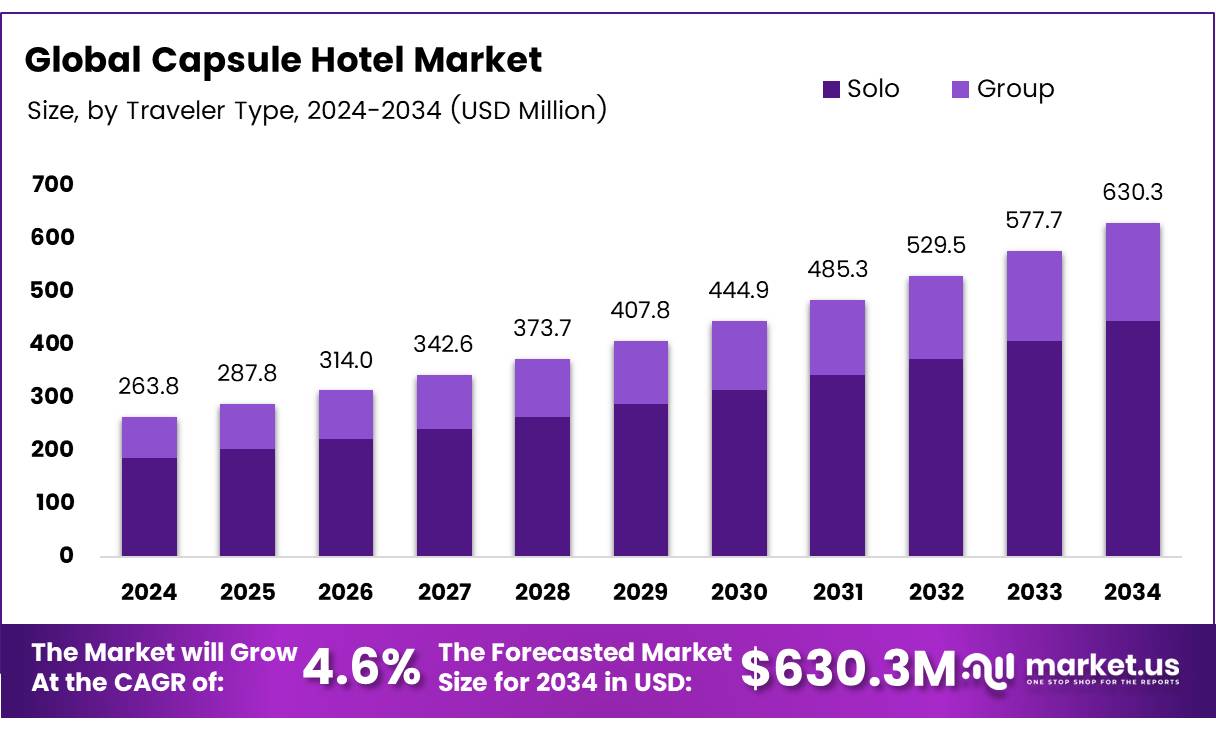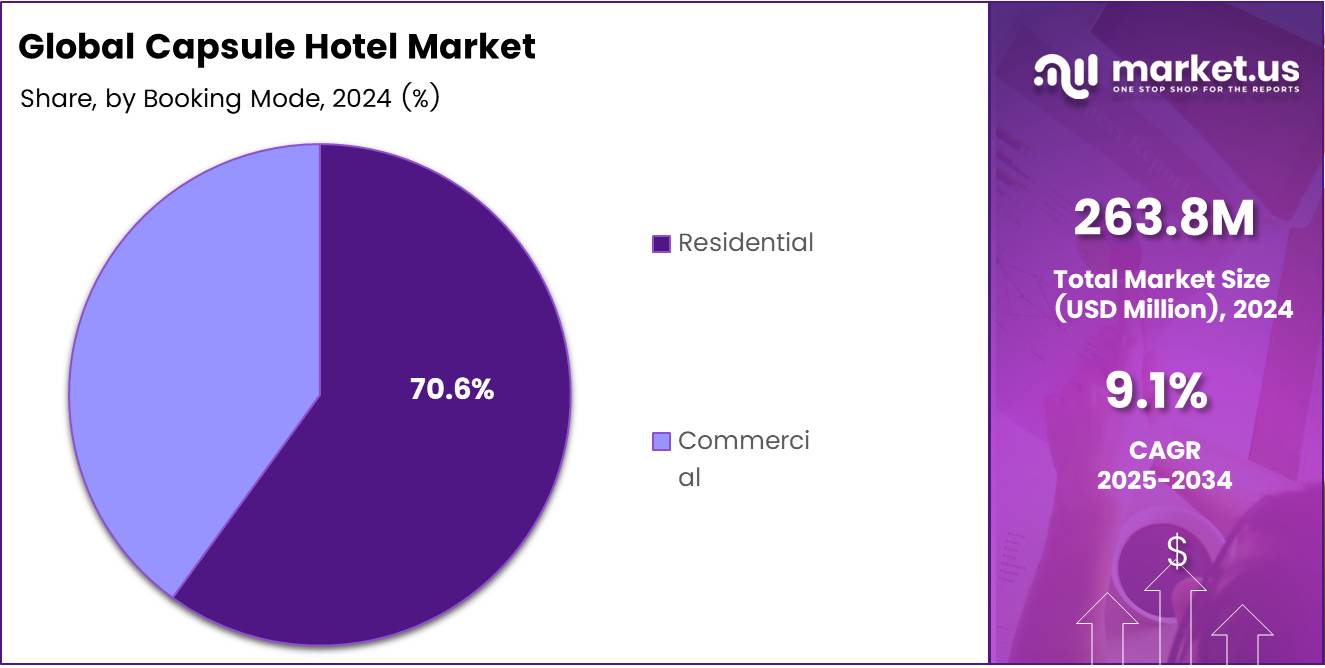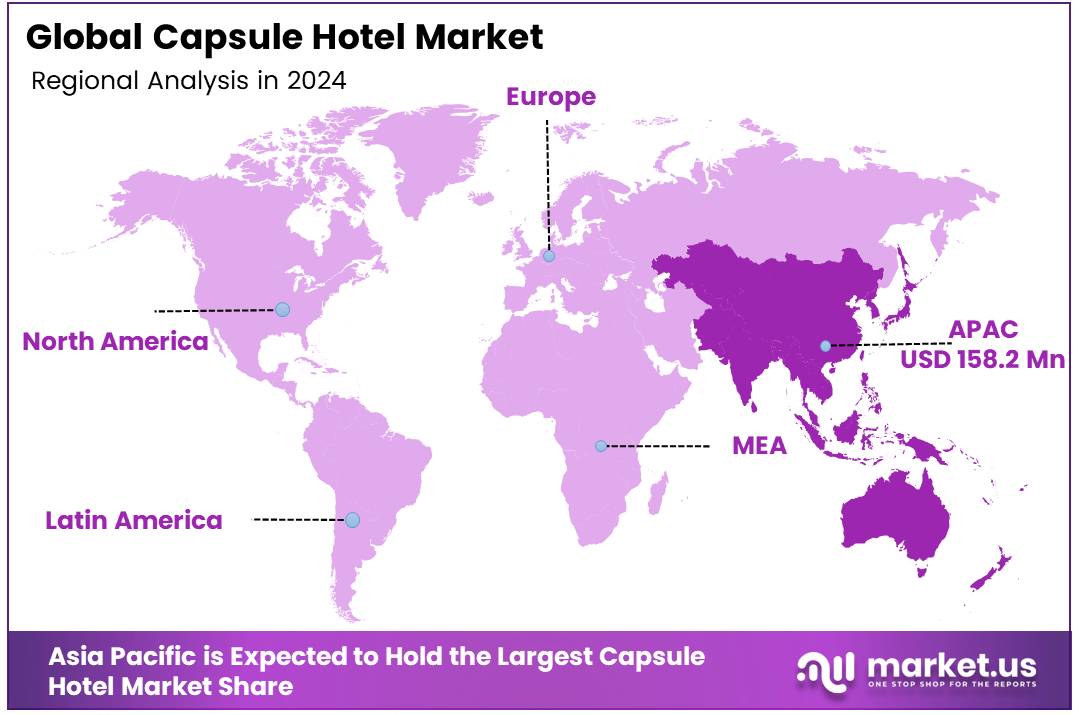Global Capsule Hotel Market By Traveler Type (Solo, Group), Age Group (18-24 Years, 25-39 Years, 40-54 Years, 55+ Years), Booking Mode (Offline, Online), By Region and Companies - Industry Segment Outlook, Market Assessment, Competition Scenario, Trends and Forecast 2025-2034
- Published date: Feb 2025
- Report ID: 139563
- Number of Pages: 202
- Format:
-
keyboard_arrow_up
Quick Navigation
Report Overview
The Global Capsule Hotel Market size is expected to be worth around USD 158.2 Million by 2034, from USD 263.8 Million in 2024, growing at a CAGR of 9.1% during the forecast period from 2025 to 2034.
The capsule hotel market, characterized by its offering of compact, economically priced accommodations targeted primarily at transient customers, presents a niche yet rapidly evolving segment within the broader hospitality industry. Originating in Japan, these hotels have capitalized on minimalism and convenience, catering to travelers seeking basic overnight lodging without the luxury of larger hotel rooms.

The concept appeals especially to urban centers where space is at a premium and cost reduction is prioritized by both operators and consumers. The market’s expansion reflects a growing trend towards budget-conscious travel and streamlined experiences, especially popular among solo and business travelers.
The capsule hotel market is poised for significant growth, spurred by increasing global travel and a shift towards budget-friendly accommodation options. According to a report by Theseus, overnight stays by tourists in Finland surged by 25% in February 2023 compared to the previous year, signaling a rebound in the hospitality sector.
This recovery highlights the potential for capsule hotels to capitalize on rising travel demands post-pandemic. Furthermore, the market’s attractiveness is underscored by high profit margins, with research suggesting that capsule hotels can achieve up to a 40% profit margin. The initial investment required to open a capsule hotel ranges from $100,000 to $300,000, presenting a relatively low barrier to entry compared to traditional hotels.
Government investments and regulatory frameworks significantly influence the capsule hotel market. These factors can either propel growth by providing financial incentives and easing zoning laws or pose challenges through stringent regulations that might restrict operational scopes or increase costs.
For instance, urban centers experiencing a surge in tourism might benefit from supportive zoning laws that allow the conversion of existing buildings into capsule hotels, thus fostering market growth. On the other hand, regulations concerning space, safety, and privacy need to be meticulously navigated to avoid compliance issues that could impede market progress.
The acceptance of capsule hotels by consumers is crucial for the market’s expansion. According to a study by Ejurnal, cleanliness, service quality, and value are highly rated by 90% of guests, who are more likely to recommend and return to these properties.
This positive customer feedback is vital for the long-term success of capsule hotels, as recommendations and repeat customers form a significant portion of the business. Offering an exceptional experience in these compact spaces can lead to higher customer satisfaction and, subsequently, more robust market growth.
Overall, the capsule hotel market is set to grow, driven by recovery in global travel, favorable investment returns, supportive government policies, and positive consumer perceptions. Businesses looking to enter this market should consider strategic locations, efficient design, and exceptional service quality to leverage the opportunities presented by this unique lodging option.
Key Takeaways
- The global capsule hotel market is projected to decrease from USD 263.8 million in 2024 to USD 158.2 million by 2034, with a CAGR of 9.1%.
- Solo travelers dominate the market, accounting for 70.6% of the market share in 2024.
- Young adults aged 18-24 are the primary demographic, holding a 41.2% market share.
- Offline booking methods are preferred, representing 61.2% of bookings in 2024.
- The Asia Pacific region dominates the market with a 60.1% share, valued at USD 158.2 million.
Traveler Type Analysis
Solo Travelers Drive Growth in Capsule Hotel Market with a Commanding 70.6% Share
In 2024, the By Traveler Type Analysis segment of the Capsule Hotel Market saw Solo occupying a dominant market position, holding a substantial 70.6% share. This significant portion underscores the growing preference among solo travelers for capsule hotels, driven primarily by the affordability, convenience, and privacy these accommodations offer.
As urban centers continue to swell and international travel becomes more accessible, solo travelers are increasingly seeking cost-effective lodging options that cater to their specific needs for flexibility and simplicity.
Conversely, the Group segment, while smaller, also plays a crucial role in the capsule hotel market dynamics. It caters to travelers in pairs or small groups who look for budget-friendly, communal lodging options that maintain a degree of privacy.
The segment’s performance highlights a niche yet vital market portion, suggesting potential for further exploration and targeted marketing strategies to attract group travelers. As the market evolves, understanding the distinct preferences and behaviors of both solo and group travelers will be key to optimizing service offerings and expanding market reach.
Age Group Analysis
18-24 years Lead Capsule Hotel Market with 41.2% Share, Reflecting Budget-Conscious Travel Trends
In 2024, the By Age Group Analysis segment of the Capsule Hotel Market saw the 18-24 years demographic holding a dominant position with a 41.2% share. This age group’s significant market presence is indicative of the growing appeal of capsule hotels among young adults, who favor these accommodations for their affordability, central locations, and modern amenities.
The trend suggests a shift towards more economical travel choices among younger travelers, who prioritize experiences and convenience over traditional luxury hotel stays.
The 25-39 years age segment also shows considerable engagement in the capsule hotel market, driven by young professionals and travelers who seek both value and privacy. Meanwhile, the 40-54 years and 55+ years age groups, although representing smaller shares, indicate a burgeoning interest which could signal a broader acceptance of capsule hotels across older demographics.
As the capsule hotel concept continues to evolve, tapping into the varied preferences of these age groups through tailored marketing strategies and diversified offerings could further propel market growth.
Booking Mode Analysis
Offline Bookings Dominate Capsule Hotel Market with 61.2% Share, Highlighting Traditional Booking Preferences
In 2024, the By Booking Mode Analysis segment of the Capsule Hotel Market saw Offline channels holding a dominant market position, with a 61.2% share. This substantial share underscores a continued preference for traditional booking methods among capsule hotel consumers, who may favor direct interactions for personalized service, the ability to negotiate rates, or simply due to habit and a lack of trust in online platforms.
The significant reliance on offline bookings suggests that despite the digital age, there remains a substantial customer segment that values the tangibility and human touch of in-person engagements.
On the other hand, the Online segment, while smaller, is poised for growth. As digital literacy improves and technology integrates more seamlessly into everyday life, the convenience and often lower costs associated with online bookings are likely to draw a larger share of consumers.
For capsule hotels, expanding and optimizing online channels could tap into the younger demographics and tech-savvy travelers, potentially shifting the balance in the future. Strengthening online presence and enhancing user experience are critical as the market evolves towards digital adoption.

Key Market Segments
By Traveler Type
- Solo
- Group
By Age Group
- 18-24 Years
- 25-39 Years
- 40-54 Years
- 55+ Years
By Booking Mode
- Offline
- Online
Drivers
Rising Travel and Tourism Industry Fuels Capsule Hotel Market Expansion
The capsule hotel market is witnessing significant growth, driven primarily by the expanding travel and tourism industry. As international and domestic travel continues to rise, there is an increasing demand for affordable and convenient lodging options.
Capsule hotels, known for their compact and cost-effective accommodations, are becoming particularly popular in densely populated urban areas where space is at a premium. This growth is further fueled by the unique appeal of capsule hotels to millennials and solo travelers who value the privacy and innovative use of space that these establishments offer.
Additionally, the surge in airport traffic contributes to the demand for capsule hotels, providing transit passengers with handy and efficient lodging solutions during layovers. These factors combined are steering the capsule hotel market towards broader acceptance and increased market penetration.
Restraints
Privacy Concerns Limit Attraction to Capsule Hotels
The capsule hotel market faces significant constraints, notably from privacy concerns and regulatory challenges. The inherent design of capsule hotels, featuring compact and sometimes shared spaces, can be unappealing to guests who prioritize privacy and the more conventional accommodations offered by traditional hotels. This deterrent is particularly strong among travelers who may find the close quarters uncomfortable.
Additionally, the development and expansion of capsule hotels are often hampered by local zoning laws and regulatory frameworks that can vary greatly from one region to another. These regulations may impose restrictions on the construction and operation of capsule hotels, limiting their proliferation in certain markets.
Together, these factors can restrict the growth potential of the capsule hotel industry, as they directly impact the feasibility and attractiveness of such accommodations in various locales.
Growth Factors
Expanding Capsule Hotels into New Geographical Markets Promises Growth
The capsule hotel market holds promising growth opportunities by tapping into new geographical regions, particularly emerging markets where capsule hotels are not yet prevalent. Expanding into these fresh territories can help capitalize on untapped customer bases that are increasingly seeking innovative, space-efficient, and cost-effective lodging solutions.
Furthermore, integrating advanced technological features such as automated check-ins, enhanced security systems, and interactive customer service can significantly improve the guest experience, making capsule hotels more attractive to tech-savvy travelers.
Additionally, situating capsule hotels in business districts presents a lucrative opportunity to attract corporate clients who require short-term, budget-friendly accommodations during business travel.
By also incorporating value-added services like high-speed Wi-Fi, varied entertainment options, and dedicated workspaces, capsule hotels can enhance their appeal to a broader audience, including business travelers and leisure guests looking for convenience and functionality. These strategies not only diversify the market reach but also strengthen the competitive edge of capsule hotels in the global hospitality industry.
Emerging Trends
Automation and Self-Service Shape the Future of Capsule Hotels
In the capsule hotel market, several trending factors are shaping its evolution and growth. Key among these is the increasing adoption of automation and self-service technologies, which streamline operations, reduce staffing costs, and enhance guest experiences through faster check-ins and customer service.
This trend is complemented by the shift towards ‘compact luxury,’ where capsule hotels are infusing their limited spaces with premium materials and advanced technological amenities. This approach targets luxury-seeking budget travelers who desire comfort and convenience at an affordable price.
Additionally, in response to heightened health and safety expectations post-pandemic, capsule hotels are investing in advanced cleaning technologies and introducing health-focused services to assure guests of their wellbeing.
Another distinctive trend is the integration of local culture and art into the design of capsule hotels, making each location a unique representation of its surroundings and enhancing the overall tourist experience. These trends not only cater to the changing demands of modern travelers but also position capsule hotels as a forward-thinking option in the competitive hospitality market.
Regional Analysis
Asia Pacific Leads Capsule Hotel Market with 60.1% Share Worth USD 158.2 Million Due to Its Origins and Popularity Among Budget Travelers
North America, Europe, Asia Pacific, the Middle East & Africa, and Latin America, each displaying unique market dynamics and growth potential. Dominating the capsule hotel landscape is the Asia Pacific region, which holds a substantial market share of 60.1% and is valued at USD 158.2 million.
This significant dominance is primarily due to the origin of capsule hotels in Japan, their increasing popularity in densely populated Asian cities, and rising demand among budget travelers seeking affordable and basic accommodations for short stays.

Regional Mentions:
In North America, the market is still nascent but shows promise due to the increasing trend of micro-hospitality and the growing demand for budget-friendly lodging options among solo and business travelers. Europe’s market is driven by the rising number of low-cost carriers encouraging short city breaks and the general trend towards minimalistic travel. However, stringent regulations and cultural preferences have moderated the pace of growth compared to Asia.
The Middle East & Africa region presents a modest market presence, with gradual growth influenced by the expanding tourism sector and initiatives to diversify economic dependence away from oil. The concept of capsule hotels is slowly gaining acceptance, particularly among transit travelers in major hubs like Dubai and Qatar.
Latin America’s market is the least developed, with limited awareness and cultural affinity towards such lodging formats. Growth in this region may rely heavily on the influence of global travelers and the gradual shift in consumer behavior towards cost-effective travel options.
Overall, while the Asia Pacific continues to lead and expand its influence in the capsule hotel market, other regions are gradually recognizing the economic and practical benefits of this unique lodging type, which is set to influence broader acceptance and growth globally.
Key Regions and Countries
- North America
- US
- Canada
- Europe
- Germany
- France
- The UK
- Spain
- Italy
- Rest of Europe
- Asia Pacific
- China
- Japan
- South Korea
- India
- Australia
- Rest of APAC
- Latin America
- Brazil
- Mexico
- Rest of Latin America
- Middle East & Africa
- South Africa
- Saudi Arabia
- UAE
- Rest of MEA
Key Players Analysis
In the rapidly expanding global capsule hotel market, several key players are distinguishing themselves through innovative offerings and strategic positioning. As of 2024, these companies cater to a diverse clientele, ranging from budget travelers to those seeking unique accommodation experiences.
The Bedstee Hotel and The Bed KLCC stand out for their blend of comfort and style, attracting tourists who prioritize aesthetics along with affordability. First Cabin HD Co. Ltd., a pioneer in luxury capsule accommodations, continues to excel by offering upscale amenities that appeal to business travelers.
CityHub and Bloc Hotel are notable for integrating technology into their guest experiences, providing apps that control room settings and offer local travel tips, which appeals to tech-savvy millennials. Meanwhile, CAPSULE HOTEL ‘DARAKHYU’ T1 leverages its location advantage at transportation hubs to serve transit travelers, offering them convenience and efficiency.
9h Ninehours remains a leader in minimalist design, promoting a futuristic approach that resonates well with international tourists. Pangea Pod Hotel and Petra Capsule Hostel focus on communal spaces to foster social interactions among guests, enriching their travel experience.
On the cultural front, Nadeshiko Hotel Shibuya caters specifically to female travelers, providing a safe and culturally immersive experience. Hippo Pod and Riccarton Capsule Hotel focus on budget-conscious travelers, offering basic amenities and competitive pricing.
Book and Bed Tokyo and Capsule Inn Osaka continue to attract bibliophiles and culture enthusiasts by incorporating thematic elements into their designs. Lastly, Cabana stands out with its spa-themed capsules, offering relaxation and rejuvenation within a compact space.
Each of these companies leverages distinct themes and locations to carve out unique market niches, catering to the evolving preferences of global travelers in the capsule hotel industry.
Top Key Players in the Market
- The Bedstee Hotel
- First Cabin HD Co. Ltd.
- CityHub
- Bloc Hotel
- CAPSULE HOTEL ‘DARAKHYU’ T1
- The Bed KLCC
- 9h Ninehours
- Pangea pod hotel
- Nadeshiko Hotel Shibuya
- Hippo Pod
- Riccarton Capsule Hotel
- Book and Bed Tokyo
- Petra Capsule Hostel
- Capsule Inn Osaka
- Cabana
Recent Developments
- In January 2025, Balmer Lawrie & Co announced its investment in NapTapGo, a ‘pod’ hotel startup aiming to revolutionize budget travel with compact, state-of-the-art accommodations. This strategic move highlights the company’s interest in innovative hospitality solutions tailored for urban settings.
- In February 2025, CoDE Concepts received the green light for their new Capsule Hotel project in Central London, marking a significant step forward in modernizing short-stay accommodations with high-tech, space-efficient sleeping pods designed for city travelers.
- In January 2025, the Miniratna PSU committed Rs 1 Crore to the cutting-edge pod hotel startup NapTapGo, setting a new standard for affordable luxury travel in India with an emphasis on comfort and design innovation in compact living spaces.
- In September 2024, Bespoke Hotels expanded its portfolio by acquiring four historic properties, including the Caledonian Hotel in Fort William and the Great Western Hotel in Oban, enhancing its offerings with these charming, strategically located accommodations.
Report Scope
Report Features Description Market Value (2024) USD 263.8 Million Forecast Revenue (2034) USD 158.2 Million CAGR (2025-2034) 9.1% Base Year for Estimation 2024 Historic Period 2020-2023 Forecast Period 2025-2034 Report Coverage Revenue Forecast, Market Dynamics, Competitive Landscape, Recent Developments Segments Covered By Traveler Type (Solo, Group), By Age Group (18-24 Years, 25-39 Years, 40-54 Years, 55+ Years), By Booking Mode (Offline, Online) Regional Analysis North America – US, Canada; Europe – Germany, France, The UK, Spain, Italy, Rest of Europe; Asia Pacific – China, Japan, South Korea, India, Australia, Singapore, Rest of APAC; Latin America – Brazil, Mexico, Rest of Latin America; Middle East & Africa – South Africa, Saudi Arabia, UAE, Rest of MEA Competitive Landscape The Bedstee Hotel, First Cabin HD Co. Ltd., CityHub, Bloc Hotel, CAPSULE HOTEL ‘DARAKHYU’ T1, The Bed KLCC, 9h Ninehours, Pangea pod hotel, Nadeshiko Hotel Shibuya, Hippo Pod, Riccarton Capsule Hotel, Book and Bed Tokyo, Petra Capsule Hostel, Capsule Inn Osaka, Cabana Customization Scope Customization for segments, region/country-level will be provided. Moreover, additional customization can be done based on the requirements. Purchase Options We have three licenses to opt for: Single User License, Multi-User License (Up to 5 Users), Corporate Use License (Unlimited User and Printable PDF) 
-
-
- The Bedstee Hotel
- First Cabin HD Co. Ltd.
- CityHub
- Bloc Hotel
- CAPSULE HOTEL ‘DARAKHYU’ T1
- The Bed KLCC
- 9h Ninehours
- Pangea pod hotel
- Nadeshiko Hotel Shibuya
- Hippo Pod
- Riccarton Capsule Hotel
- Book and Bed Tokyo
- Petra Capsule Hostel
- Capsule Inn Osaka
- Cabana









